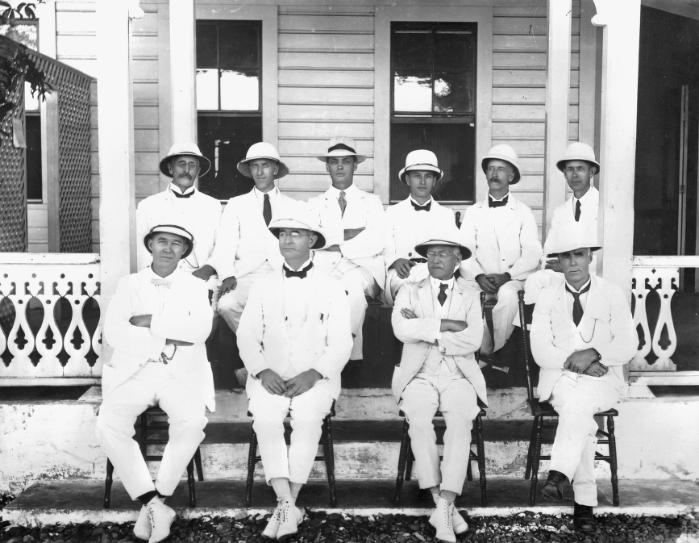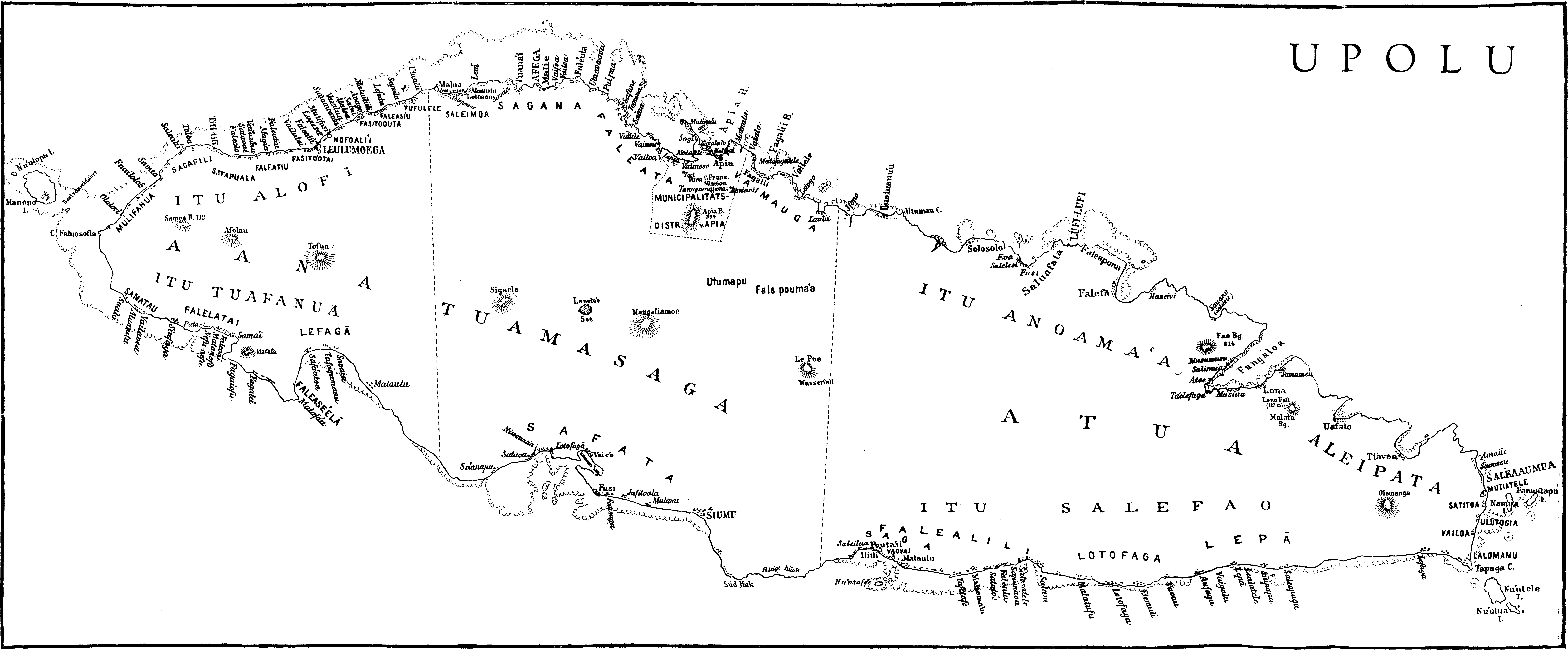|
Mulinu'u
Mulinu'u is a small village situated on a tiny peninsula on Upolu island in Samoa. It became the site of the colonial administration in Samoa in the 1870s and continues to be the site for the Parliament of Samoa. It is located on the central north coast of the island and is part of the urban area comprising Apia, the country's capital. Overview Mulinu'u peninsula, where this and some other villages are situated, is the site of the Fale Fono or Parliament House in Samoa as well as the Lands and Titles Court. At the tip of the peninsula is the meteorology office which was initially established in the late 19th century as an observatory. The peninsula is also the site for several important tombs including that of the previous Head of State, Malietoa Tanumafili II. The population of Mulinu'u village is 27. It is part of Tuamasaga Tuamāsaga is a district of Samoa, with a population (2016 Census) of 95,907. The geographic area of Tuamasaga covers the central part of Upolu island. ... [...More Info...] [...Related Items...] OR: [Wikipedia] [Google] [Baidu] |
Mulinu'u By Tattersall Studios - Samoa 1893-1949
Mulinu'u is a small village situated on a tiny peninsula on Upolu island in Samoa. It became the site of the colonial administration in Samoa in the 1870s and continues to be the site for the Parliament of Samoa. It is located on the central north coast of the island and is part of the urban area comprising Apia, the country's capital. Overview Mulinu'u peninsula, where this and some other villages are situated, is the site of the Fale Fono or Parliament House in Samoa as well as the Lands and Titles Court. At the tip of the peninsula is the meteorology office which was initially established in the late 19th century as an observatory. The peninsula is also the site for several important tombs including that of the previous Head of State, Malietoa Tanumafili II. The population of Mulinu'u village is 27. It is part of Tuamasaga Tuamāsaga is a district of Samoa, with a population (2016 Census) of 95,907. The geographic area of Tuamasaga covers the central part of Upolu island ... [...More Info...] [...Related Items...] OR: [Wikipedia] [Google] [Baidu] |
Apia
Apia () is the Capital (political), capital and largest city of Samoa, as well as the nation's only city. It is located on the central north coast of Upolu, Samoa's second-largest island. Apia falls within the political district (''itūmālō'') of Tuamasaga. The Apia Urban Area (generally known as the City of Apia) has a population of 37,391 (2016 census). Its geographic boundaries extend roughly from Letogo village to the newer, industrialized region of Apia known as "Vaitele". History Apia was originally a small village (the 1800 population was 304), from which the country's capital took its name. Apia Village still exists within the larger modern capital of Apia, which has grown into a sprawling urban area that encompasses many villages. Like every other settlement in the country, Apia Village has its own ''matai'' (leaders) and ''fa'alupega'' (genealogy and customary greetings) according to fa'a Samoa. The modern city of Apia was founded in the 1850s, and it has been ... [...More Info...] [...Related Items...] OR: [Wikipedia] [Google] [Baidu] |
Malietoa Tanumafili II
Malietoa Tanumafili II (4 January 1913 – 11 May 2007), addressed Susuga Malietoa Tanumafili II, was the Malietoa, the title of one of Samoa's four paramount chiefs, and the head of state, or ''O le Ao o le Malo'', a position that he held for life, of Samoa from 1962 to 2007. He was co-head of state in 1962 with the ''tama-a-'aiga'' Tupua Tamasese Mea'ole and became the sole head of state on 15 April 1963 upon the death of his co-regent. At the time of his death, he was the oldest national leader in the world, and was also the last incumbent president-for-life in the world. His Highness Malietoa Tanumafili II was also the first head of state to be a follower of the Bahá’í Faith. The Malietoa is one of the four ''tama-a-'aiga'' (maximal lineage) titles of Samoa, alongside Tupua Tamasese, Mata-afa and Tuimalealiifano. Following an extended period deliberation, the Malietoa title passed to his eldest son, Malietoa Fa’amausili Molī. Early and personal life His Highnes ... [...More Info...] [...Related Items...] OR: [Wikipedia] [Google] [Baidu] |
Samoa
Samoa, officially the Independent State of Samoa; sm, Sāmoa, and until 1997 known as Western Samoa, is a Polynesian island country consisting of two main islands (Savai'i and Upolu); two smaller, inhabited islands (Manono Island, Manono and Apolima); and several smaller, uninhabited islands, including the Aleipata Islands (Nu'utele, Nu'ulua, Fanuatapu and Namua). Samoa is located west of American Samoa, northeast of Tonga (closest foreign country), northeast of Fiji, east of Wallis and Futuna, southeast of Tuvalu, south of Tokelau, southwest of Hawaii, and northwest of Niue. The capital city is Apia. The Lapita culture, Lapita people discovered and settled the Samoan Islands around 3,500 years ago. They developed a Samoan language and Samoan culture, Samoan cultural identity. Samoa is a Unitary state, unitary Parliamentary system, parliamentary democracy with 11 Administrative divisions of Samoa, administrative divisions. It is a sovereign state and a member of the ... [...More Info...] [...Related Items...] OR: [Wikipedia] [Google] [Baidu] |
Scene
Scene (from Ancient Greek, Greek σκηνή ''skēnḗ'') may refer to: Arts, entertainment, and media Music *Scene (subculture), a youth subculture from the early 2000s characterized by a distinct music and style. Groups and performers * The Scene (Canadian band), The Scene who recorded the song "Scenes (from Another World)" * Scene, the stage name used by Japanese Punk guitarist Minoru Kojima * Selena Gomez & the Scene, an American band * The Scene (Canadian band), a late 1960s psychedelic Canadian band * The Scene (Dutch band), a Dutch band formed by Thé Lau Albums * ''Scene'', a 2005 noise Masami Akita discography, album by Merzbow * Scenes (album), ''Scenes'' (album), a 1992 music album by Marty Friedman * The Scene (Eskimo Callboy album), ''The Scene'' (Eskimo Callboy album), an Eskimo Callboy album * ''The Scene'', the debut album of The Scene (Dutch band), The Scene Other uses in music * S.C.E.N.E. Music Festival, an annual festival held in downtown St. Catharines, Ont ... [...More Info...] [...Related Items...] OR: [Wikipedia] [Google] [Baidu] |
Upolu
Upolu is an island in Samoa, formed by a massive basaltic shield volcano which rises from the seafloor of the western Pacific Ocean. The island is long and in area, making it the second largest of the Samoan Islands by area. With approximately 145,000 inhabitants, it is by far the most populous of the Samoan Islands. Upolu is situated to the southeast of Savai'i, the "big island". Apia, the capital, is in the middle of the north coast, and Faleolo International Airport is at the western end of the island. The island has not had any historically recorded eruptions, although there is evidence of three lava flows, dating back only to between a few hundred and a few thousand years ago. In the Samoan branch of Polynesian mythology, Upolu was the first woman on the island. James Michener based his character Bloody Mary in ''Tales of the South Pacific'' (later a major character in the Rodgers and Hammerstein musical, '' South Pacific'') on the owner of Aggie Grey's Hotel on the so ... [...More Info...] [...Related Items...] OR: [Wikipedia] [Google] [Baidu] |
Legislative Assembly Of Samoa
The Legislative Assembly ( sm, Fono Aoao Faitulafono a Samoa), also known as the Parliament of Samoa ( sm, Palemene o Samoa), is the national legislature of Samoa, seated at Apia, where the country's central administration is situated. Samoan Parliament is composed of two parts: the O le Ao o le Malo (head of state) and the Legislative Assembly. In the Samoan language, the Legislative Assembly of Samoa is sometimes referred to as the Samoan Fono while the ''government'' of the country is referred to as the Malo. The word ''fono'' is a Samoan and Polynesian term for councils or meetings great and small and applies to national assemblies and legislatures, as well as local village councils. The modern government of Samoa exists on a national level alongside the country's '' fa'amatai'' indigenous chiefly system of governance and social organisation. In his or her own right, the O le Ao o le Malo can summon and call together the Legislative Assembly, and can prorogue or dissolve P ... [...More Info...] [...Related Items...] OR: [Wikipedia] [Google] [Baidu] |
Tuamasaga
Tuamāsaga is a district of Samoa, with a population (2016 Census) of 95,907. The geographic area of Tuamasaga covers the central part of Upolu island. History & Politics Malie & the Malietoa The paramount ''matai'' title of Tuamasaga is the Malietoa title. Led by Auimatagi, Sa Malietoa and the nine senior orators of Malie are responsible for the election of the Malietoa title-holder at Niu'ula in Malie. Given that the district of Aiga-i-le-Tai ( Manono and Apolima) and the district of Fa'asaleleaga on Savai'i are two key footholds of the Aiga Sa Malietoa (Malietoa clan), Malie often consults with Manono (capital of Aiga-i-le-Tai) and Safotulafai (capital of Fa’asaleleaga) in the election of the Malietoa. The village of Malie is the seat of the Malietoa. At a national level, the Malietoa title is one of the four ''Tama-a-Aiga'' (noble families) titles. Apia, the nation's capital, is situated in the north of the district. The national parliament also sits at Mulinu’u to ... [...More Info...] [...Related Items...] OR: [Wikipedia] [Google] [Baidu] |
Populated Places In Tuamasaga
Population typically refers to the number of people in a single area, whether it be a city or town, region, country, continent, or the world. Governments typically quantify the size of the resident population within their jurisdiction using a census, a process of collecting, analysing, compiling, and publishing data regarding a population. Perspectives of various disciplines Social sciences In sociology and population geography, population refers to a group of human beings with some predefined criterion in common, such as location, race, ethnicity, nationality, or religion. Demography is a social science which entails the statistical study of populations. Ecology In ecology, a population is a group of organisms of the same species who inhabit the same particular geographical area and are capable of interbreeding. The area of a sexual population is the area where inter-breeding is possible between any pair within the area and more probable than cross-breeding with in ... [...More Info...] [...Related Items...] OR: [Wikipedia] [Google] [Baidu] |




